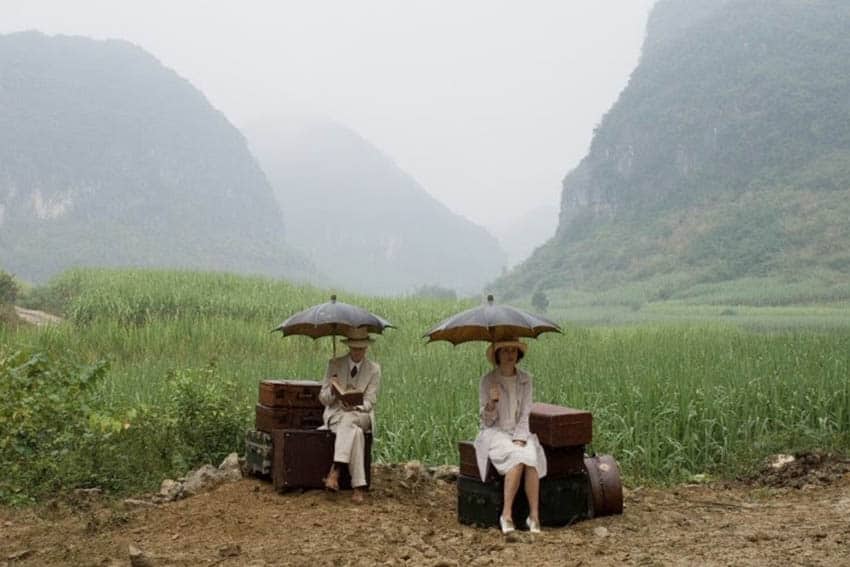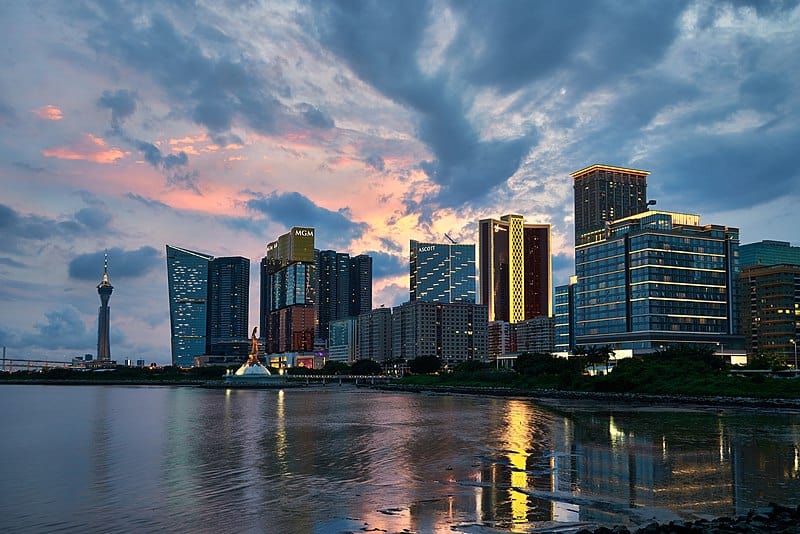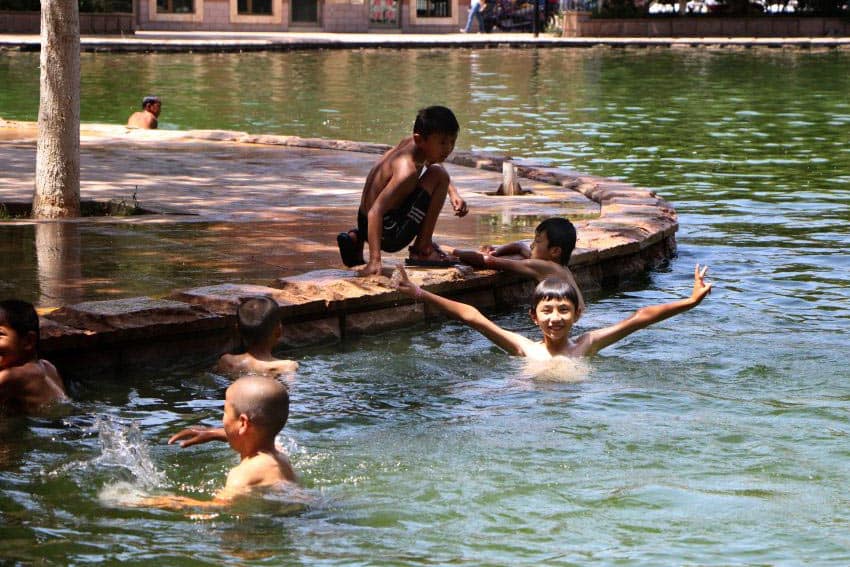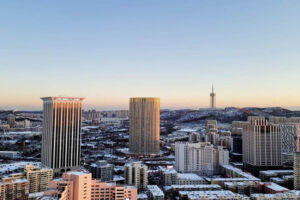By Jemima Price
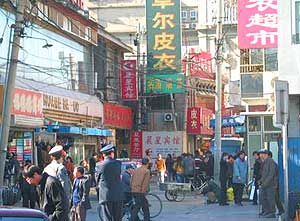
“What is that?” Jennie asked me pointing to what looked like vacuum-packed sick in a bag.
We were shopping in a small grocery store in Beijing, trying for the life of us to find some kind of food we recognized. We left empty-handed.
Arriving in China is a bit like arriving on the moon; you’ve seen all the pictures, you think you know what to expect, but it’s more alien than you can imagine.
Clean Air at the Airport
The first thing that struck me upon our arrival was the clean crisp air outside Beijing airport – strange when the air everywhere else around the city is as thick as soup with pollution.
We endured a hair-raising journey to our hotel; cars driving inches apart or reversing down motorways, cyclists and pedestrians everywhere. Not so different to other cities you might say; except here it’s almost like a dance, with everyone seamlessly managing to avoid each other.
It is almost as if the vehicles have minds of their own. We saw one man driving a motorbike while staring intently through some binoculars in the opposite direction; another was driving apparently asleep!
Bamboo Garden Hotel
We were relieved when we arrived alive at the Bamboo Garden Hotel which we had booked in advance – it was our treat to get us started. This beautiful, serene hotel was an oasis of calm after the chaos we had just become unwittingly embroiled in.
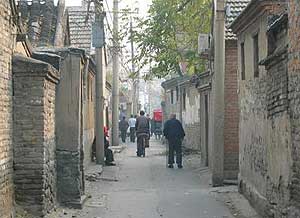
It is a traditional courtyard-style hotel with rooms built in a square around a garden dotted with bamboo and weeping willows.
We had a delicious and very cheap lunch at the hotel restaurant during which we managed to make our first faux pas by attempting to ask where the toilet was using our phrasebook, and realizing much later on that we had asked for the slang equivalent of ‘bog’.
Luckily we received polite titters in return from the bemused waitresses. Sated, we bit the bullet and headed out into the scary city for a walk.
Ancient Beijing
The hotel was in a hutong, or an ancient alleyway that forms part of a maze of thousands of narrow cobbled streets. The buildings are low and in the traditional style, some housing fruit-sellers or stalls selling deep-fried pastries and meats on sticks.
Cyclists weave around you; elderly people amble along clad in their tunics and trousers still entrenched in their Communist past; small bars with red lanterns hanging outside their windows line the streets.
Heading out onto the main roads outside the hutongs we were struck by the utter craziness of the place; huge bright signs hang everywhere showing doe-eyed, pale-skinned girls smiling shyly down at you; mad cyclists and rickshaw-drivers rush past you; the bang and crash of construction echoes around you as the city frantically prepared itself for the Olympics.
But what strikes you most is how clean it is. There is no rubbish anywhere.
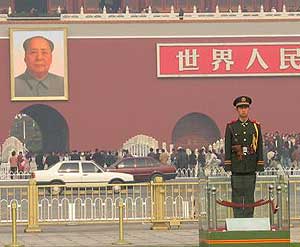
We eventually found a strip of modern, stylish bars by a beautiful lake with trailing willow trees. We got stung for expensive drinks but we were jetlagged to the eyeballs and sitting there in the moonlight we couldn’t be bothered to argue!
Square and the City
The following day we saw a completely different side to Beijing; the Beijing that I, along with most people, had fantasized about. Deciding to avoid the traffic on the roads, we set off on an immense walk from the hutongs down to the Forbidden City and Tiananmen Square.
In comparison with the narrow, winding hutongs, the streets here are wide and tree-lined, and the buildings immaculate and huge. Soldiers stand sentry everywhere.
Tiananmen Square is impressive in its vastness. Hordes of people mill about taking photos, flying kites or simply huddle in groups talking. On the Tiananmen Tower, a huge picture of Chairman Mao watches proudly over the square.
Trying to Sell a Mao Watch
We were stalked by the obligatory hawker covertly trying to sell us a watch with a picture of Mao on its face – the clock hands were his arms. We wisely declined and later saw a woman being arrested for hawking the same watches. We were also approached by numerous people who wanted to take our photos; we found we were an endless source of interest to the local Chinese.
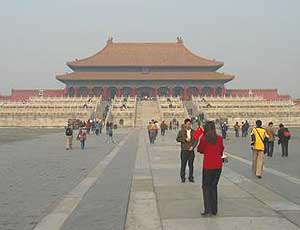
To the north of Tiananmen Square lies the Forbidden City, which was the imperial palace during the Ming and Qing dynasties and is now known as the Palace Museum.
The architecture is exquisitely detailed and the light reflecting off the yellow glazed tiled roofs is dazzling but we were so jetlagged all we could think about by now was food and sleep.
We managed to satisfy the former – I never dreamed I would eat a bowl of noodles sitting in a palace! The latter was satisfied by sleeping on our feet.
Bar by Any Other Name
As is the way with jet-lag, when night time came around we were wide awake so we headed to one of the new bars springing up along the lakes near the hutongs and chose one because it looked cozy – being November, Beijing was cold!
The three men inside looked surprised to see us when we went in. We sat upstairs, and I noticed an alcove in the wall with a low table and a floor covered in cushions. It looked comfortable so we climbed up the small ladder into the alcove and settled ourselves on the cushions.
As I looked around I noticed the x-rated statues on the shelves behind our heads, the paintings of nude women all over the walls and the rather suggestively-shaped cushions. After finding a box of tissues under the table we realized we weren’t sitting in an ordinary bar!
The manager came up frantically waving his hands and looking embarrassed so we climbed out of the alcove and perched politely at a table instead. It was only after we realized that there were some “customers” waiting to come upstairs, and I peered into the bin and saw lots of used tissues, that we downed our drinks and fell over ourselves to get out.
The Art Student Scam
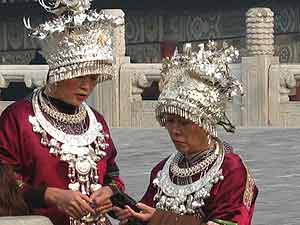
That was our last day of flash-packing; we moved to a hostel on the other side of the city the next day, which was surprisingly pleasant.
The area is just as busy and full of character as the hutongs but in a modern way – huge billboards tower over the traffic-choked streets, KFC restaurants are dotted amongst the noodle shops and electronic stores with blaring techno music. A bit Blade Runner-esque.
We went for a walk and whilst standing in Tiananmen Square trying to decide where to go next we were approached by a very friendly art student who took us to see his classmates’ exhibition in the local museum. The artwork was exceptional, and he wrote our names in Chinese calligraphy on rice paper for us to take away.
We somehow emerged, however, after all our plans to not spend money on souvenirs, each clutching a silk painting after having parted with what turned out to be quite a bit of money. It was only when we met other travelers on the road who reported similar meetings with friendly “art students” in other Chinese cities that we realized we’d been had. Still we came away with a very lovely and unique souvenir.
| The Famous Chinese Tea Scam |
We ate at the hostel restaurant that night – a small room with Formica tables and a tiny bar. I was forced to overcome my hatred for beer as it’s the only thing to drink other than rather noxious rice liqueur. And the bottles are at least as big as my forearm so it was a baptism of fire!
Summer in the Heart of Winter
The following day was beautifully sunny and we spent it aptly in the gorgeous Summer Palace. Situated in the western outskirts of Haidian District, the Summer Palace is 15 km from central Beijing. It was the holiday home of the Empress Dowager Cixi. It is quite simply a massive garden filled with woods, lakes, palatial pagodas, temples, pavilions and marble, arched bridges.
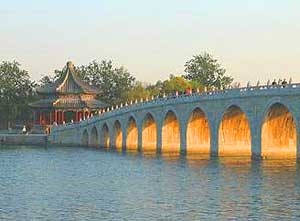
After rushing around Beijing for a few days it was wonderful to stroll around this ethereal place and drink in the sight of pagodas peeping through the tree-tops, or paved walkways framed by swaying willow trees.
Unfortunately upon our return to Beijing we had a huge trek to the train station to get our tickets to Xian. Train stations tend to be huge and bewildering in China – and especially so in Beijing where English is not widely spoken and there are no English signs to be found.
Luckily local people are amazingly helpful and will really go out of their way to help. They appear reserved but once you engage someone in conversation, their face breaks into a grin and they can’t do enough to help you.
Pink Wafer Biscuits and Peking Duck
The following day was the thing we had looked forward to more than anything, and the most major landmark of them all – the Great Wall of China.
Naturally, we woke up late and had to jump on a bus approximately eight minutes after waking up. This meant that we only had what was left over in our rucksacks from the day before which turned out to be half a bottle of water and a packet of pink wafer biscuits. This was to provide for four of us during a 10km trek along the wall!
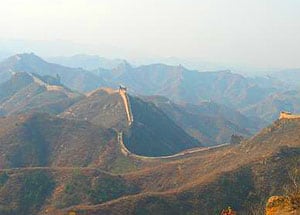
After an excruciatingly cold and bumpy 130km drive that took nearly four hours due to traffic and the ancient bus, we set off along the wall.
Set amidst the most striking stark and bleak scenery of brown hills rolling away into the hazy distance, the Wall really lives up to expectations.
Avoiding Badaling
We had avoided the more touristy trips to renovated sections of the wall such as Badaling, and had chosen to travel to the quiet and remote Simatai section where the wall’s ruinous state, merely rubble in places, has given it the reputation of being the most beautiful and authentic section of the Wall.
Local people claim that it was after a visit to Simatai that UNESCO decided the Wall should be declared a World Heritage Site.
The trek was hard – in some places the steps are at a gradient of seventy degrees as the wall climbs like a spine over steep and craggy hills. It can even be hazardous in places, but this offers that frisson of excitement to those more hardened hikers looking for adventure.
We were also followed by “shadows”; Mongolian women who walk with you all the way guiding you merrily and then at the end pounce on you to try to force you into buying their souvenirs. They are good walking companions, but be prepared for some hard-talking at the end of the exhausting climb!
That night we had to experience Peking Duck. We chose one of the numerous small restaurants along the street from our hotel. The duck was superb, although we had to eat it with a critical audience – the manager and waitresses stood around us barking instructions on how to use our chopsticks to roll the pancakes, and then laughing heartily along with the other diners as we made a pig’s ear of it.
Be aware that the décor of a restaurant in China says nothing about the quality of the food. Most restaurants are stark, basic and brightly lit with strip lights, but choose the ones that are patronized by locals – that’s a good sign of a decent eatery.
You will also find street stalls everywhere selling pastries or other small snacks on sticks. Don’t worry too much about the meat: what you don’t know won’t hurt you! And don’t bother trying to shop in a grocery store – you won’t recognize anything!
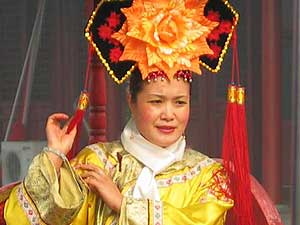
Spitting and Dodgy Hairdressers
Beijing’s draw for the Western traveler lies in its sheer alien other-worldliness not to mention the buzz of its streets, the massive variety of hugely important things to do, the wonderful inquisitiveness of its inhabitants.
There are however two things to watch out for. One: the spitting. Everyone spits everywhere. The authorities are trying to stamp it out what with the upcoming Olympics and the expected increase in tourism, but as soon as you step into the backstreets away from the uniformed police, it’s pretty off-putting as you’re about to bite into a sweet pastry and someone hocks up a big phlegm onto the floor in front of you – be warned!
Two: it becomes pretty obvious pretty quickly that there is an inordinate amount of hairdressers. Most of these are not hairdressers – they tend to be skilled in other areas (such as pedal massages?).
If you really do need a haircut don’t under any circumstances try and get a haircut first thing in the morning or you will get turned away in disgust for being some kind of pervert. Besides what kind of reprobate wants a pedal massage at eight o’clock in the morning?
Accommodation
Bamboo Garden Hotel
24 Xiaoshiqiao, Jiugulou St | Xicheng District, Beijing 100009, China
Average Price – 300 RMB (double)
Beijing Far East International Youth Hostel
90 Tieshu Xiejie, Xuanwu District, Beijing, Beijing, 100053, China
Average Price – 60RMB (dorm room)
Sights
The Great Wall of China – Simatai Section
Getting There
You can take the coach at Beijing Bus Station in Dong Zhi Men to Miyun County where you change to a minibus that goes direct to the sightseeing spot.
Alternatively, there is a No. 12 tourist Bus from either the Xuan Wen Men or Dong Si Shi Tiao stops.
An economy class ticket costs 60 RMB and the luxury class costs 70 RMB. Departure times are from 06.00 hours to 08.00 hours.
Or you can ask around in hostels in Beijing and you’ll find trips to this section although they are not as widely available as trips to other busier sections of the Wall. Trips cost around 150RMB.
Admission Fee: 40 RMB
Opening Hours: 08:00 to 16:50
The Forbidden City
Admission Fee: 40 RMB (Nov. 1 to Mar. 31)
60 RMB (Apr. 1 to Oct. 31))
Opening Hours: 08:30 to 16:20 (Oct. 16 to Apr.15)
08:30 to 17:00 (Apr. 16 to Oct. 15)
The Summer Palace
Getting there
Bus Route: 907, 375, 801, 808, 732, 394, 718
Admission Fee: 35 RMB (Nov. 1 to Mar. 31)
35 RMB (Apr. 1 to Oct. 31)
Opening Hours: 07:00-17:00 (Nov. 1 to Mar. 31)
06:30-18:00 (Apr. 1 to Oct. 31)

Jemima Price is an English graduate and qualified Systems Engineer, who gave everything up to travel the world. After driving around Australia in a van and teaching in Swaziland, she recently decided to return to the UK and be sensible but instead accepted a job in Barbados.
- The Wild Mississippi: 2340 Miles Across Ten States - April 8, 2024
- Exploring the Floating Villages of Tonle’ Sap Lake - April 3, 2024
- Woman Traveling Solo on Turkish Buses - March 27, 2024


